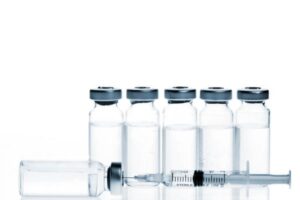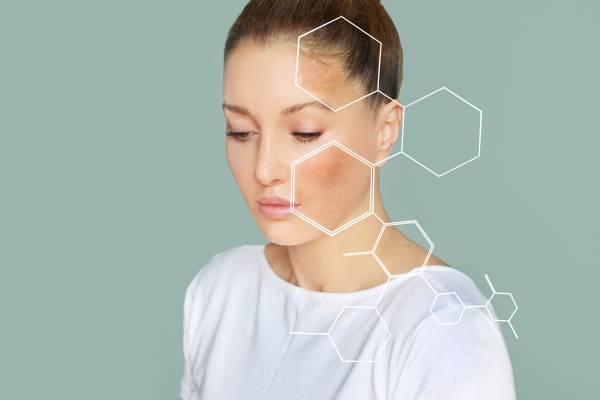
Maximising Results with GHRP-6 and Ipamorelin Peptide Stacking
Peptide stacking is a sophisticated method that involves the deliberate selection and combination of specific peptides to enhance their individual effects, leading to superior results

The quest for the Fountain of Youth is a timeless one, and in the contemporary world, it often leads us down the path of advanced skincare science. One such breakthrough that has caught the attention of Europe skincare enthusiasts and experts alike is the GHK-Cu peptide, a naturally occurring copper complex that has been gaining fame for its remarkable anti-aging properties. In this post, we’ll unwrap the science behind GHK-Cu and understand why it’s becoming a staple in the beauty routines of those chasing eternal youth.
GHK-Cu stands for Glycyl-L-Histidyl-L-Lysine-Copper, a tripeptide consisting of three amino acids (glycine, histidine, and lysine) and bonded to a copper ion. This compound was originally discovered in human plasma but is also present in various bodily fluids and tissues. It’s known to play a multifaceted role in the body’s natural processes, including wound healing and immune function.
Europe Researchers have found that the concentration of GHK-Cu peptide in the body diminishes with age, which is where synthetic versions come into play as a topical application in skincare.
One of the most coveted effects of GHK-Cu is its ability to stimulate collagen and elastin production in the skin. Collagen provides the skin with structure and elasticity, while elastin helps the skin to return to its original shape after stretching or contracting. By boosting the levels of these key proteins, GHK-Cu helps to maintain firm, youthful skin and reduces the appearance of fine lines and wrinkles.
GHK-Cu peptide has been shown to facilitate the repair of tissues, including the skin. It accelerates the healing of various types of wounds and can diminish scarring. For those concerned with the effects of environmental stressors, such as UV rays and pollution, GHK-Cu provides a means to counteract damage and encourage regeneration of skin cells.
Oxidative stress contributes significantly to the aging process. GHK-Cu’s antioxidant properties means it can neutralise free radicals, rogue molecules that contribute to the deterioration of skin cells. Incorporating GHK-Cu into your skincare regime can protect against premature aging and maintain a healthy complexion.
Users of GHK-Cu peptide often report an improvement in overall skin tone and clarity. The peptide is thought to decrease hyperpigmentation and even out skin tone, resulting in a brighter and more radiant complexion. This is particularly beneficial for individuals looking to reduce the appearance of sun spots or age-related discoloration.
Direct SARMs Europe is committed to supplying high quality research SARMs including GHK-Cu peptide products, including Vials, Nasal Sprays and Pre-mixed peptides. The newest innovation is Direct SARMs Europe GHK-Cu Capsules which aims to make your research more convenient and accurate. With high oral bioavailability it is tipped to become a best seller.
Discover the full range of GHK-Cu products from Direct SARMs Europe.
The GHK-Cu peptide is a revolutionary addition to the anti-aging arsenal, offering benefits that go beyond mere superficial improvements. It works at a cellular level to enhance skin health, texture, and resilience, ushering in a modern era for skincare where ingredients backed by science become our allies in the fight against time.
[1] The human tripeptide GHK-Cu in prevention of oxidative stress and degenerative conditions of aging: implications for cognitive health. Oxid Med Cell Longev. 2012;2012:324832. by Pickart L, Vasquez-Soltero JM, Margolina A
[2] Intranasal GHK peptide enhances resilience to cognitive decline in aging mice. bioRxiv [Preprint]. 2023 Nov 17:2023.11.16.567423. by Tucker M, Keely A, Park JY, Rosenfeld M, Wezeman J, Mangalindan R, Ratner D, Ladiges W.
[3] The potential of GHK as an anti-aging peptide. Aging Pathobiol Ther. 2020 Mar 27;2(1):58-61 by Dou Y, Lee A, Zhu L, Morton J, Ladiges W.
Disclaimer: We do not supply sarms or peptides to any individual under the age of 21. You must be a licensed and qualified healthcare practitioner. Our team of dedicated professionals are committed to providing an extensive range of products used ONLY in the process of laboratory research by responsible trained and professional individuals. All products listed on this website (direct-sarms.com) and provided through Direct Sarms are intended for laboratory research purposes only. The products listed on this website are NOT for human or animal consumption or ingestion of any kind.

Peptide stacking is a sophisticated method that involves the deliberate selection and combination of specific peptides to enhance their individual effects, leading to superior results

Maximizing Healing and Rejuvenation: Exploring the Benefits of TB500 and GHK-Cu Peptides Combined In the rapidly changing field of biomedical research, peptides have become key

Worldwideshipping

Visa/Mastercard/Zelle
Cryptocurrency /Transfers

Safe and Secure Shopping

We Distribute
From

YOU MUST BE OVER 21 YEARS IN ORDER TO USE THIS WEBSITE. All of the products are to be handled only by properly trained and qualified LABORATORY or RESEARCH professionals.